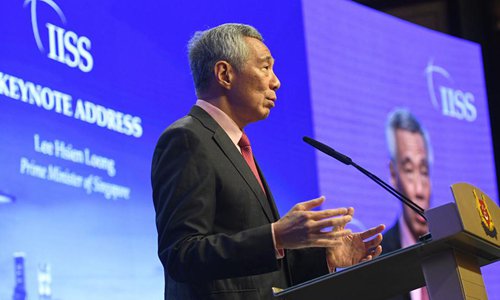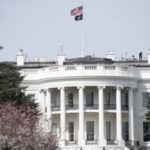Singaporean Prime Minister Lee Hsien Loong. Photo: Xinhua
Singapore’s success in striking a delicate balance between “maximum protection of public health” and “minimum impact of economy” offers a new perspective for some Chinese metropolises trying to resume work as COVID-19 continues to spread globally, experts said.
Singapore is escalating its prevention and control measures against the COVID-19 pandemic, especially involving imported cases, as the country reported 47 more infections on Wednesday, the biggest one-day spike, with 33 imported cases. The total now rises to 313.
Foreign media reported that Singapore is facing a second wave of coronavirus cases as travelers, especially those from Europe, the new epicenter of the pandemic, are bringing back new risks of infection.
Singapore residents returning from abroad and foreign visitors to the country are requested to serve a 14-day stay-home notice, Singapore’s Ministry of Manpower announced on Sunday, noting the move will take effect from 11:59 pm on Friday. The measures also affect all foreign domestic workers entering the country starting March 16.
Singapore’s government has restricted the entry of visitors from many European countries, South Korea and Iran due to a rise in imported cases. They also strongly discouraged citizens from traveling abroad and recalled exchange students who had studied abroad.
The country’s heightened restrictions against imported cases is unsurprising, as its previous strategies were not enough to cope with the escalating pandemic, said Huang Yanzhong, a senior fellow for global health at the Council on Foreign Relations of the US.
Singapore’s response should serve as a model for other countries and regions that have successfully conducted initial prevention and control, especially large cities with broad international exchanges, as they could welcome a wave of imported infections, Huang said.
All government decisions to combat the epidemic are essentially balanced between “maximum protection of public health” and “minimum impact on the economy,” Huang said, noting that in the face of imported risks, Singapore is leaning toward the former. Zhuang Guotu, head of Xiamen University’s Southeast Asian Studies Center, told the Global Times on Thursday that the country, without resorting to China’s draconian measures, contained the virus outbreak at a minimum cost, which metropolises should learn from.
Singapore was well-prepared before the outbreak because of the SARS outbreak in 2002-03, said Zhuang, noting they used those hard-won lessons learned from SARS and investments in science, research, and technology to combat the COVID-19.
The country has about six times the population density as Beijing, and is close with China in geography and bilateral exchanges, which caused a high risk of a virus outbreak, but Singapore responded very quickly after the first case was found in the country in early January and successfully slowed the virus spread.
Zhuang listed several of Singapore’s policies against the virus that other countries should adopt. For example, they didn’t ban public transport or normal manufacturing, which ensured normal economic development; and they prioritized following the instructions of medical professionals while the government acted as a backup.
Metropolises such as Beijing, Shanghai and Guangzhou should speed up the resumption of work and production, and closely follow imported cases amid the worldwide pandemic, Zhuang said.
Zhuang warned Chinese cities not to implement “one-size-fits-all” policies and encouraged them to shift from stringent containment policies to a mitigation strategy as the epidemic appears to be under control in China.
Zhuang said China should strengthen cooperation with Singapore on medical research, and share information on imported infections.
China is willing to, together with Singapore, further strengthen coordination, explore the establishment of a joint prevention and control mechanism, and participate in and advocate international and regional cooperation, said Chinese State Councilor and Foreign Minister Wang Yi during a phone conversation with Singapore Foreign Minister Vivian Balakrishnan, Xinhua News Agency reported Wednesday.



